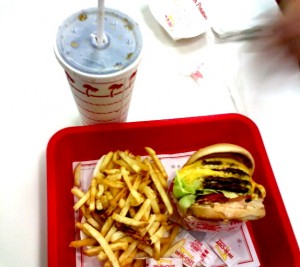Anybody that knows me well, knows that I’m a fabulous sleeper. You say the word ‘sleep’ (or pyjamas for that matter) and I’m in la-la land. Despite my innate ability, not being able to get a good night’s rest is an issue that I find many of my clients struggle with on a regular basis. Not only are poor sleep patterns frustrating, but they can also affect our health and weight. Most of us know the feeling of being tired, but not enough shut-eye on a regular basis can negatively affect our mood making us irritable, anxious and more prone to becoming depressed. It’s also been shown that inadequate rest slows down our brain activity including our ability to learn, remember things and concentrate while also reducing how we handle stress and maintain a healthy immune system.

Another important reason to get enough sleep is the effect that a lack of sleep has on our waistlines. It seems that when it comes to body weight, it may be that if you snooze – you lose (weight that is). Not sleeping seems to be related to an increase in hunger and appetite and as a result putting on weight. According to a number of recent studies, people who sleep less than six hours a day were almost 30% more likely to become obese than those who slept seven to nine hours. The current research has focused on the link between sleep and the hormones that regulate appetite.

Ghrelin is the hormone that stimulates hunger and leptin is the hormone that signals fullness to the brain and helps to suppress appetite. It seems that sleeping less is associated with a decrease in leptin (the satisfaction secret) and an increase in ghrelin (the hunger gremlin). Having said all this, not only does sleep loss make you hungrier, but it also stimulates cravings for those ‘fatty’, ‘sugary’ foods like cakes, chocolate and biscuits to give you a boost of energy to keep you going during the day. Vicious circle.

There are a number of things to consider to help you get a restful night of shut-eye and eating the right foods can certainly help you to fall asleep faster and improve the quality of your sleep.
THE ‘NO NO’s’
- Caffeine – Avoid any caffeinated beverages from 2pm, especially if you are sensitive to caffeine. This includes coffee, tea, energy drinks and coke. Also, don’t forget that chocolate also has caffeine in it (along with lots of sugar) so probably best to keep your intake of this to a limit also!
- Large Meal Close to Bedtime – Heavy meals high in fat and calories less than three hours before going to bed rev up active digestion and can often leave you feeling uncomfortably full or, even worse, cause heartburn or reflux. Watch out for spicy foods for the similarly aggravating effects they can have.
- Processed Meats – They’re an easy choice for a quick meal but processed meats such as ham, bacon, sausages and smoked meats contain high levels of the amino acid tyramine, which stimulates the brain to give you a buzz.
- All Liquids 90 Minutes Before Going to Bed – It takes about 90 minutes for the body to process liquids, so limit liquids of any kind for at least 90 minutes before bedtime if the need to urinate wakes you up in the middle of the night.
- Alcohol – Do not use alcohol to help you fall asleep. Although alcohol may initially induce sleep, once it wears off, the sleep tends to be broken. Plus, alcohol generally makes you need to go to the loo through its dehydrating effect on the body which means you’ll probably be waking up to pee throughout the night.
THE GOODIES
- Almonds – Almonds contain magnesium which promotes both sleep and muscle relaxation, they have the added benefit of being high in protein which can help maintain a stable blood sugar level while sleeping
- Banana – Bananas are an excellent source of magnesium and potassium, which help to relax stressed muscles. They also contain tryptophan which is the amino acid that the body uses to make serotonin and melatonin – the hormones that slow down the traffic in your brain and make you sleepy. (Serotonin also helps to regulate your mood and appetite).

- Dairy – Yogurt, milk and cheese contain tryptophan but they also contain another important nutrient – calcium. Calcium is a sleep-inducing vitamin as it relaxes muscles and nerves in the body but it also helps the brain use the tryptophan to manufacture melatonin. Makes a glass of warm milk the perfect little sleeping tablet!
- Cherries – This yummy summer fruit have been shown to contain a significant level of the hormone melatonin which will help you to start feeling sleepier at night.
- Porridge – The low-GI carbohydrates in a bowl of oats triggers the body to produce insulin which can speed up the release of serotonin leading to sleep. Plus the milk in it will have an added positive effect.
- Tea – Yes, avoiding all caffeine in the evening is essential, but some herbal varieties can help get you into sleep mode. Chamomile tea is well known as a helpful and safe sleep aid and green tea (must be decaf) contains theanine which helps promote sleep.
SLEEPING PILL OR BEDTIME SNACK?
An all-carbohydrate snack, especially one high in added sugar is less likely to help you sleep. You’ll miss out on the positive effects of tryptophan and you may set your body off on the roller-coaster ride effect of plummeting blood sugar followed by the release of stress hormones that will keep you awake. The best bedtime snack is one that has both low GI (slowly released) carbohydrates, protein and some calcium.
For a good night’s sleep try:
- a glass of warm milk
- small bowl of traditional oats made on milk
- almond butter on a slice of grainy toast
- grainy cracker (like Ryvita) topped with a small slice of low-fat cheese
- low-fat natural yoghurt with fresh or frozen cherries
- banana smoothie made on low-fat milk

But keep in mind that it takes about one hour for the tryptophan in the foods to reach the brain, so don’t wait until right before bedtime to have your snack.
OTHER THINGS TO SNOOZE ABOUT…
- Exercise – While exercise is good for you in many ways and can assist with relaxation if it is done to close to bedtime, it can actually
stimulate your body too much to allow rest. This happens as a result of the endorphin/adrenaline rush of high-intensity exercise and also because of higher body temperature (a cooler body temperature promotes sleep). The best advice is to try to schedule your exercise in the morning or at least five hours before your scheduled bedtime (takes about that long for your body to cool down properly).
- Stress – If you have a lot on your mind, consider keeping a journal next to your bed so you can scribble down any thoughts that won’t let your mind settle.
- Tiredness – It might seem obvious but go to bed when you are tired. Don’t wait until Desperate Housewives is finished because there is a good chance that you will start to feel more awake again which will make it more difficult to get to sleep.
Let me know how you go with these tips and if anybody has any other tips that have worked for them, please feel free to comment below.
Sweet dreams!
Julie.
